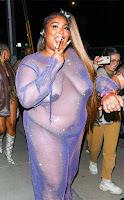What Happened to Our Blackness? Wokeness Under Siege in the Age of Pop Culture
So I ask, for my friends who are parents of small children, teens, and young adults: when did our collective “wokeness” get bent into the false promise of social media stardom—where influencers thrive on spectacle, while showing little regard for the moral, social, or communal norms that once held us accountable?
And let me add a smile here—I know I’m not a Gen X or Gen Z insider with the mental currency to decode every cultural explosion that scrolls across a screen. Before the haters hate, do appreciate that I’m not oblivious to pop culture. I’m just generationally challenged. Call it baby boomer talk—said with both love and bewilderment.
Lil Nas X, once relatively unknown to the wider public, rose to stardom through a carefully orchestrated mix of identity, controversy, and marketing spectacle. Nicki Minaj and Cardi B, with their hyper-sexualized performances and explicit lyrics, are crowned as queens of culture. Lizzo—undeniably talented—is too often celebrated less for her artistry than for the spectacle of body politics attached to her image.
“Is it his musical talent, or the way his sexuality has been packaged as spectacle, that drives the attention? The artistry is tangled up with a marketing machine that thrives on provocation.”
Nicki Minaj deserves a dubious award for how her vaccine commentary went viral.
Cardi B has turned sexual bravado into her lyrical brand, with WAP functioning as a cultural flashpoint—and, troublingly, as unfiltered curriculum for young listeners.
Lizzo Bares Almost All in See-Through Mesh Gown for Cardi B's Birthday PartyAll the rumors are true: Lizzo showed up to Cardi B's 29th birthday in a completely see-through mesh gown. See the “Good as Hell” singer’s bold look below.
And where I land is here: the words of the Black National Anthem, Lift Every Voice and Sing. A verse that refuses to be dated, no matter how many hashtags or headlines rise and fall:
Stony the road we trod,Bitter the chastening rod,
Felt in the days when hope unborn had died;
Yet with a steady beat,
Have not our weary feet
Come to the place for which our fathers sighed?
We have come over a way that with tears has been watered,
We have come, treading our path through the blood of the slaughtered,
Out from the gloomy past,
Till now we stand at last
Where the white gleam of our bright star is cast.


A 14 year old shared a very distilling perspective
ReplyDeleteWe often miss our lines communication..so it just happened that we discussing Art..
I look at a wall and said. To me this is a beige wall. Yet in someone else's eyes they may conjure it up to be a masterpiece.
Then her illumination..perhaps in the mind or draw if painting..it may be how the paintbrush was held, or if the paint strokes were up and down. Or even with fluid strokes.
I asked her to look at the Lizzo picture in this blog
She scowled. Then explained that fashion and the premise of nakedness can be well crafted or it can be insulting to the expression of fashion
Note there was no attempt to vulgarity or to label body shaming as in my own 65 year old attempt of moralizing nudity with fat bodied with vulgarity
Her explanation was very inclusive. Her aesthetician visual interpretation was that wearing an all mesh gown with no concept of artistry or fashion construct was far more offensive than my attempt at body shaming
The reveal on why Lil Nas X as an artist was beyond the clammer of religious or moralistic divisiveness was her very intelligent sophistication and artistic comprehension of the primal instinctive assessment of an artistic statement
She contested my position that the LilNasX appeal began as an exploitative introduction to amass an audience of a younger generation
Her very matter of fact analysis was, he was being branded and merchandised under the pretext of wholesome and safe. That, she explained, if you listened to Old Country Road lyrics, it was about misogyny and cheating on women and classic shoot em and womanizing.
She further elucidated LilNasX changed his music artistic style to be authentically loud and proud..as a black gay man in a very privileged music industry
Then she said this, all this Christianity BS over Montero, the lap dance with the Devil was the very faith driven, defile the devil dogma..expressed in more cleaner ways, our good books and teachings, rather that a gay man having dominance over the Satan with a very lurid lap dance
I was schooled..I had to unlearn, unpacked, and pay attention